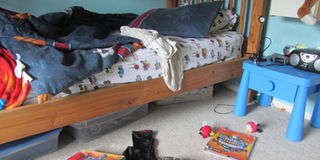Tips to help get children to clean their rooms

Children in elementary school should be able to do most of the tasks involved in cleaning their rooms on their own. NET PHOTO
What you need to know:
BORDERS. When you think your child is being unreasonable, there are ways you can set limits for them as Sara Bean writes.
My 13-year-old daughter’s bedroom is so awful it looks like a tornado just ripped through it! When I ask her to clean it up, she either ignores me or throws a fit!” If this sounds like your child, you are not alone. Many people complain of rooms so messy they cannot walk through them, dirty laundry piled in heaps on the floor (along with the clean clothes) and garbage scattered throughout their children’s rooms. It is frustrating to deal with a child who refuses to take care of her space. So what will a parent do?
Divide and conquer. First of all, if your child’s room is a complete wreck that you can barely walk around inside of it, it might be really helpful to divide the room into quadrants and have your child work on one quarter of the room at a time. Or, have her focus on one item at a time—first trash, then clothes, then toys. Breaking a large task down into smaller pieces is helpful for any child.
Put yourself in your child’s shoes and think about how she might see it: she might not know where to start and might be thinking, “Wow. I am never going to be able to get this done. What’s the point in trying?” So break it down and work at it using small steps at first.
Give “hurdle help”. Young children, especially might truly need you to help them get started. It is okay to spend 15-30 minutes in the room with your child, depending on his age, showing him steps required to complete the task.
For example, you might teach your child to pick up the clothes on the floor, inspect them, and then either put the clothes in the basket or put them away. It is important that children know exactly what your expectations are. Many times we think they know how to do certain tasks, but they do not—they need to be shown the ropes first before they really get it. This allows you the opportunity to role model a bit for your child, which clarifies what you are looking for in a way that does not result in you cleaning the room for him.
Don’t be a martyr. If your child is old enough to do it, do not clean your child’s room for her. Stepping in and cleaning your child’s room on your own works against you. It shows your child that you do not think she can do it on her own and that if she drags her feet and resists you enough you will give in and do it yourself. It might even show her that she does not really have to do what you say—that what you say isn’t what you mean.
When children get that message, your authority is in jeopardy. Doing it yourself might seem easier, but in the long run it will contribute to your child’s lack of motivation around this chore. Rule of thumb, once children are in elementary school, they should be able to do most of the tasks involved in cleaning their rooms on their own. Just hold them accountable.
Note
Children will always make their own choices no matter what; as long as you are problem-solving with your children, using rewards and consequences to motivate them and hold them accountable, as well as supplying them with the necessary ‘tools’ to take care of themselves and their space, that’s the best you can do.
*This article is intended to address children for whom mental health issues have been ruled out.
Use task-oriented consequences. Put a privilege on hold until a certain part of the task is done. So if you decide that today all the clothes need to be picked up, the computer is on hold until that is done. Then you work on something else tomorrow. Once your child does get the room picked up, it can be helpful to set up a weekly expectation for cleaning. This might mean their weekend does not start until the room is clean (and be specific about what “clean” means). Does this guarantee that your child will keep his room clean on his own from now on? No. But using consequences and rewards will help him learn the desired behaviour over time. As James Lehman says, “You can lead a horse to water and you can’t make him drink—but you can sure make him thirsty!”
-Handinhandparenting.org




